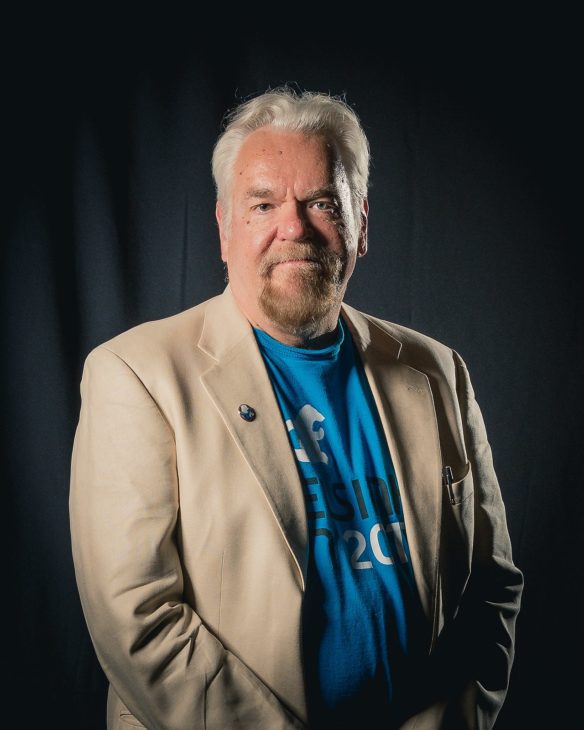
WALTER JON WILLIAMS is the winner of two Nebulas and a five-time Hugo nominee. His most recent books are The Sundering, The Praxis, This Is Not a Game, and Quillifer. In 2006, Williams founded the Taos Toolbox, a two-week writer’s workshop for fantasy and science fiction writers. He was the guest of honor of the 2017 Worldcon in Helsinki. Williams lives near Albuquerque, New Mexico, with his wife, Kathleen Hedges.
File 770 reviewed his latest book, Fleet Elements here.
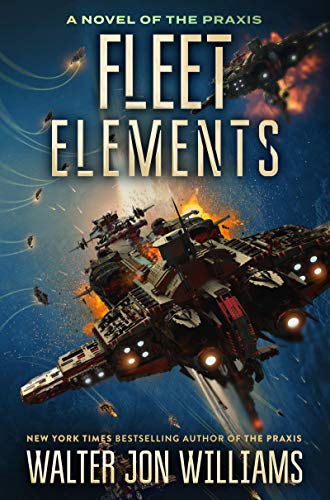
MIKE GLYER: Fleet Elements is the latest novel in your Dread Empire’s Fall series. (Which I confess to thinking of as the Praxis series.) You once told an interviewer, “As for the Shaa, for now they’re all dead, but I reserve the right to alter reality at any point.” They’re still dead in Fleet Elements, yet you’ve managed to shed new light on them and turn their history into a mystery that might be important to solve. Other authors – Larry Niven, for one – talk about having to be careful that new stories that don’t violate some already-established part of their series’ universe. How do you overcome that challenge?
WALTER JON WILLIAMS: I keep copious notes, I try to re-read the books before starting a new one, and I have complex plot outlines on legal pads, with different colors for different characters, and lots of arrows and diagrams. Then I just cross my fingers and hope I don’t make a mistake.
(By the way, I call it the Praxis series, too.)
MG: A series balances the familiar with change and growth. What’s your strategy for character development?
WALTER JON WILLIAMS: Character development is a consequence of trauma, so I try to keep my characters as traumatized as possible.
MG: The demise of the Shaa, of course, is the event that kicks off the Praxis series. Until then, the various sentient races of the Empire enjoyed a kind of equality in their subordination to the Shaa. When one of them tried to move into the power vacuum, humans were still aligned with the other nonhumans. But in the latest arc they’re on their own. Although milestone space operas from the Lensman Series to Starship Troopers to Ender’s Game set up genocidal conflicts between humans and aliens, that hasn’t been characteristic of your series before now. Are you going there, or will the end game somehow weave all these species together again?
WALTER JON WILLIAMS: I don’t really want to offer spoilers on whether the human race is exterminated by the end of the series. That’s giving away a little much.
At the end of the current series there will be an adjustment to the political system, which may well set up more conflict farther down the line. Plus I also guarantee more character-developing trauma for my characters.
MG: On one level the science fiction genre is a conversation, where writers see what’s gone before and say “I’d love to tell more stories like that” or “No, can’t you see how wrong that extrapolation is?” Who are some of the authors who inspired your interest in writing a space opera series like this, for either of those reasons?
WALTER JON WILLIAMS: This is going to sound odd, but my inspirations for the Praxis books include Herodotus, Polybius, Livy, Cassius Dio, Edward Gibbon, and Thomas Babington Macauley, all historians writing on an epic (and at present unfashionable) scale. From them I learned how to tell a vast, complex story against a background of Deep History.
I might as well add HG Wells to that list, not only for the inevitable influence of his scientific romances, but for his concept of history.
MG: You have penned several different series – in fact, after reading The Accidental War I not only sought out the rest of the Praxis books, I proceeded to read most or all the books in four other series. And I see readers commenting on my blog about their hopes that you’ll do another Metropolitan book, another Quillifer, another Dagmar Shaw. Will you keep the Praxis series going beyond this latest arc? What are you working on now?
WALTER JON WILLIAMS: The Praxis series was originally intended to run 9-12 books (depending on when I got bored), so there will be more if the publisher so desires. The Metropolitan series was cut short when my editor was fired and his entire science fiction line canceled, and I’ve been hoping to find an editor willing to reprint the originals and complete the series with a third book. (And yes, I know I could self-publish the third book, and I will if I have to.)
The Quillifer series was planned for six books, though I’ve contracted only for three. So if your readers want more of those, they should buy the hell out of the books now in the stores.
All this said, I have the urge to write some singletons, so once I finish with my current contracts I’m going to write a stand-alone or two.
MG: What are your sources of “inspiration” beyond just the literary? Someone once asked the composer Hoagy Carmichael where his inspiration came from, and his answer was “When the check arrives.” At this point in a successful career do you have more freedom to choose what to work on?
WALTER JON WILLIAMS: While I’m not rich, I’m financially secure, and I don’t have to write anything I don’t want to.
And while I like having money, money has nothing to do with why I write. If all I wanted was money, I’d run a hedge fund or something. Except for a very few lucky people, a career in the arts is a perilous balancing act between inspiration and the need to pay the rent.
I have the wonderful privilege of creating something new every day. That other people might want to read what I write is a bonus, but I’d still be writing even if I had no audience.
And as for inspiration, usually it comes from other writers. When I was ten years old, reading great writers made me want to write something great. That hasn’t changed at all.
MG: How has your career changed today changed from when you were younger? What do you like or dislike about the changes?
WALTER JON WILLIAMS: I have more security now , a lifetime of experience, and a large backlist available to readers. When I was younger I had a lot more energy, and a lot less cynicism.
The thing I most dislike is people assuming they know all there is to know about me. After all, I’m over fifty, right? I must have nothing interesting left to say.
I would like to submit that these people are wrong.
MG: What is one life lesson or writing skill you’re glad to have a chance to pass on through the Taos Toolbox?
WALTER JON WILLIAMS: What I tell my students is that they should be writing because they love it. Any other reason— money, fame, ticking off something on your bucket list— is inadequate, and will lead to disappointments.
You can’t control what shape your career will take— it could be killed by a single failure on the part of someone in production (which has happened to me). You can’t predict the readers’ reaction to your work. Odds are good that you’ll have multiple careers under multiple names, as the early careers founder (which happened to me)— but if you love the work, you’ll learn your lessons, become a better writer, and carry on.
Which also happened to me. Love of the work carried me through, and if you don’t do it for love, there’s no damn reason to do it at all.
Discover more from File 770
Subscribe to get the latest posts sent to your email.

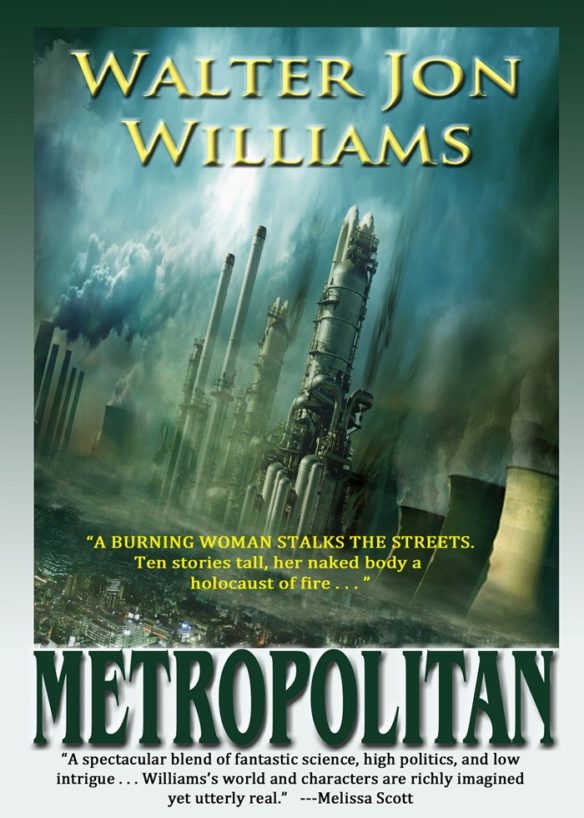
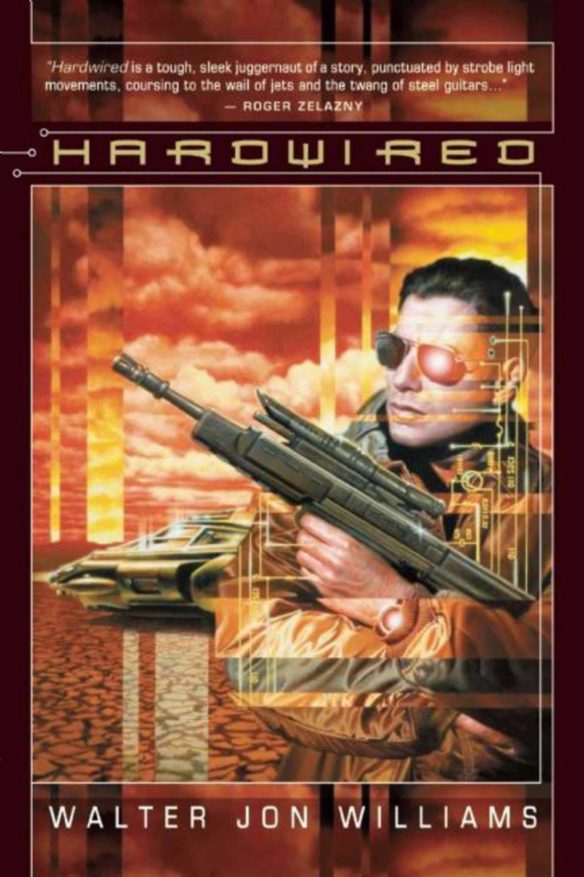
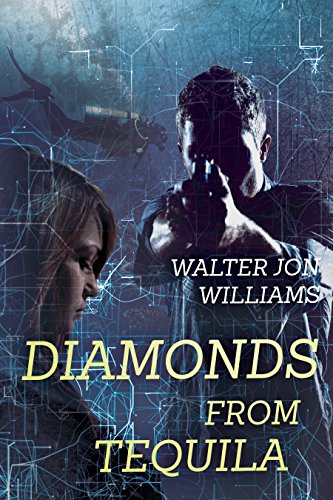
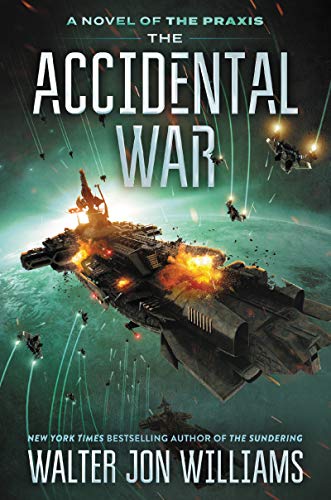
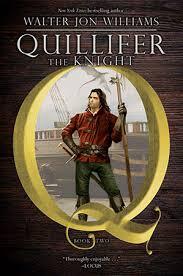
Walter always delivers a solid story; he’s one of my favorite writers.
I can’t think of a writer with greater range writing today.
Brother, if you write the third Metropolitan book I’ll buy it, and I’ll tell everyone I know to buy it too.
When will the sequel to fleet elements come out?